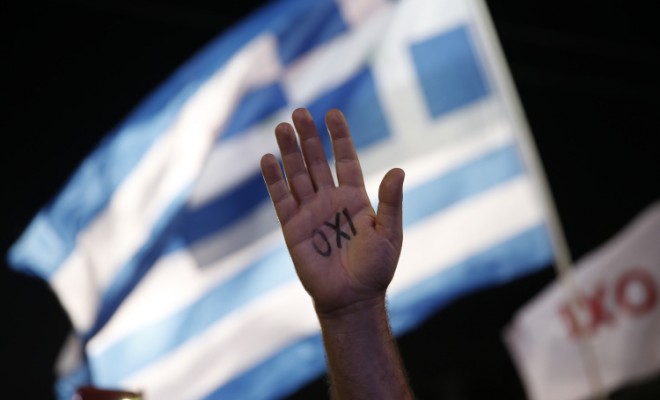By Dimitris Konstantakopoulos
It is unpleasant to have to write about issues such as these. For every Greek who loves his country, it is painful (and perhaps not always risk-free) to have to delve into the tragic reality we currently experience; to have to expose facts and people and to demystify politicians and leaders who were believed by an entire people and maybe by himself! But what other way is there? They have almost taken our whole country. We must at least save our minds. It is only when we find the courage to look reality in the face, that we will we be able to fight it.
This summer’s Greek tragedy constitutes a coup against the will of the Greek people and a triumph of the Empire. The elections are nothing but a link to the chain of coups against democracy which followed the referendum.
First comes the signing of the agreement, despite the mandate of the Greek people and contrary to the opinion of the SYRIZA party elected organs. Then, an incredible piece of legislation, which runs to many hundreds of pages and nobody manages to even skim through, is passed under ridiculous circumstances in what is a parody of parliament. Now, after all that’s happened, we are witnessing a further attempt to “reinterpret” the referendum result through the process of elections; elections that are planned to take place while Greeks are still in a state of absolute shock, confusion, grief and disorientation caused by their leaders, who, I am afraid, have been “properly” manipulated, by foreign forces.
Those who decided these elections want to escape their guilty and bury deep their nightmare, that is the “No” result of the 5th of July referendum. They want to add a semblance of legitimacy to the regime formed through the violation of the Greek people’s mandate. Another purpose is to salvage, while there is still time, the new SYRIZA-Tsipras party, which, for as long as it’s there, it shall serve as: a) their most powerful weapon for passing the austerity Memorandums and for destroying the Greek centre-left; and, b) the most willing enforcer of US interests in our region with regards to our “national issues”; in fact, it is their favourite candidate for moving forward issues which have been “persistent over time” in the agenda of Washington, such as the dissolution of the Republic of Cyprus through a new version of the Annan plan.
Shortly after the elections announcement by Tsipras, Juncker expressed his hope that the elections will broaden the support of the Greeks for the agreement with the creditors. “The elections are part of the solution, not of the problem”, said Merkel, who, not long ago, would not even hear about elections.
Juncker himself and all European governments and institutions are aware, all pretensions aside, that they have imposed a form of dictatorship on Greece though an agreement which is directly opposed to the recently expressed, in a direct way, will of the “sovereign people”. The Prime Minister of Slovakia has even admitted publicly that they have established a form of protectorate in Greece. He added “so what?” They are now attempting to “reinterpret” the referendum result through the elections. After the elections, they will argue that Greeks have again elected pro-memorandum parties and therefore they support the agreement-Memorandum. Their ultimate objective is to legitimize their coup and also the fact that they have managed to destroy a European country as a result of the policies they imposed on it.
But, should Juncker and the likes of him, and also Tsipras himself, really desired a genuine democratic legitimisation, the only way to overturn the result of the 5th of July would be by a further referendum where the Greek people would be asked whether they approve or not the agreement they signed. On the contrary, in the forthcoming elections we are not invited to vote for or against the agreement they imposed on us. We are asked to choose who shall be the one to administer our destruction.
In reality, Juncker and Merkel couldn’t be more wrong! Regardless of the election result, the Greek issue is nowhere near to be resolved. It will enter now its most dangerous and tragic phase!
The triumph of the Empire
There is no greater victory than transforming to an obedient instrument and active promoter of your policies the very same leader of the revolted people! Greeks have peacefully rebelled against the neo-colonial regime of the austerity memorandums, by electing last January the SYRIZA-ANEL government and, especially, by voting in July, in an overwhelming majority, “No” to the memorandums.
There is no greater victory than being able to make a political party, the name of which includes in it the words “radical left”, to enforce the most extreme-right neoliberal programme that has ever been implemented anywhere in Europe.
The leadership of the Greek Left has been often accused in the past of huge mistakes, of betrayals, even of crimes sometimes. But the Greek Left, for all the critique of the world, has offered rivers of blood, struggling to defend democracy and national independence of Greece. There is no greater victory for the Empire than leading now the still official leaders of the Greek Left to trample on those very same fundamental values; to brutally ignore the mandate of the 5th July; to bring in parliament, in the middle of the summer, bills comprising of hundreds of pages which have been hastily translated in Google and voted in a ridiculous all-nighter session, in order to validate through the “representatives of the Greek people” the will of foreigners; concluding in this way, the total transformation of the country to a colony and a protectorate (and also transforming in the way the Party into a kind of personal property of its leader).
Thousands and thousands in this country, who gave their lives for democracy and national independence of Greece, are turning in their graves.
Why did Tsipras fall into the “trap”?
We will only briefly touch upon the very interesting topic of the complex factors which may explain the Ovidian transformation of the prime minister; a metamorphosis that brings to mind “Circe’s work” and it was so impressive that if Homer was writing his Odyssey now, he would surely include it in it.
Alexis Tsipras has never truly believed in the power of his own party and in the potential of the country to accomplish the tremendous work of national resistance and regeneration; a narrative upon which he himself relied in order to come to power as he so much wanted. But Tsipras is not stupid, as in fact could be claimed for other prime ministers. He knew that he had to find a solution for Merkel. He relied on those he thought that he could rely on, in order to solve the problem and so he placed his hopes in parts of the American and international financial establishment. From there he got – or at least so he thought – the assurances, which sustained up to the very last moment his “super-optimism” about striking a deal. He ignored common sense, he did not listen to the repeated and dramatic warnings offered by many of us, even by Lafontaine and the Linke leadership, who were in a much better position to predict Merkel’s and Schäuble’s next moves than anybody else. He got scared with the perspective of a real confrontation with creditors and he never wanted such a confrontation. He has never prepared himself or any other for that matter- for the clash which would nearly inevitably result from any attempt to bring to a stop the memorandum policies or which would be perhaps necessary for any attempt to save the country. He was surprised of the extent in which Greeks supported the No vote, under the most harsh conditions and he did not know what to do whit the result. In short, he was manipulated into choosing paths that finally led to a huge defeat for the Greek people and to his own self-demise.
Today, both his government and he personally, are bound, more now than ever before, by the forces who “fooled” them or, to be more precise, helped them to get “fooled”. This is the reason why the deputy prime minister Yiannis Dragasakis has publicly thanked the US government for the conclusion of the agreement-capitulation.
Tsipras as an instrument for the enforcement of the Memorandum
In an almost Kafkaesque atmosphere, Tsipras’s personality is brought now forward as the most powerful case against Greek people. It is almost like having Ioannis Metaxas after the historic No and a month or so of fighting, signing the capitulation and explaining how impossible and disastrous would be a “clash” with Mussolini’s forces. What would have happened in the battlefront after such statements and acts? (Metaxas was prime minister at the time of Mussolini’s ultimatum against Greece in 1940, which he refused to accept going instead to war, tr.note),
The message “transmitted” by Tsipras or, better, by his spin professionals, goes as follows:
“Take a look at this young man. He fought for six months; he gave his best. How could it ever be possible that this smiling young man you have trusted, supported, voted for, should have tricked you? Could it ever be possible that he, a politician of the Left, should be a traitor? Is it possible that you may have been totally deceived? No. If Tsipras and SYRIZA can’t do it, if they can’t free the country from the debt chains, then nobody can. Should anyone else try, it could end in disaster. Hence, we must all give in and accept all that is dictated by the Europeans and the Americans, and just try to make the best of it”
It is also implied that he is somehow “cornered” into remaining in power, just for saving us, by making smoother …. the unhealthy consequences of the agreement he himself signed! That he would rather prefer, instead of being in the prime minister’s office having to talk all the time with Merkel and Hollande, to return to the popular tavernas of Galatsi (or the Ekali clubs) and be, for the rest of his life, the subject of hatred and scorn, by a – not inconsiderable – portion of the Greek people; because of course, all dreams, be them good or bad, come to an end and everyone will at some point recover from the shock, no matter how severe it was. (What they say to him, the same fatal friends and advisors he has trusted all along, is that he has to continue being the man at the helm, that his leadership quality reminds somewhat of De Gaulle or of Mitterrand or that he is the new “Andreas Papandreou”; as if it could ever be possible, regardless of one’s opinion about Andreas Papandreou and PASOK and their huge significance, be that good or bad, for the country, to reduce them to a collection of tricks and successful cheatings!).
But at this stage, even if the poor Greek people – who are being continuously bombarded by all sorts of communication and political blows, before they feel the more fatal material blows of the Third and most severe Memorandum – decide not to believe all this, what else is there to think about? They will have probably concluded by now that everything is “pre-planned”, that there is nothing that they can do and therefore one must focus on how to survive; that there is no point in voting or, at the very most, one could just vote for Leventis, who quite recently became the sweetheart of the media oligarchy; and because the “empire”, using perhaps one of Athens’ hotels as its base, has ears everywhere, watches everything and reacts to every little thing, they spread in the internet misleading information about elections being declared void if turnout is less than 50%, aiming at increasing abstention rates.
Communication in the era of totalitarianism
Tripras’s communication message and the use of the one-man show strategy as the most effective weapon against his own camp and nation constitutes perhaps one of the greatest achievements of political technology of all times. It’s worth noting that this is not the kind of stuff that can be produced by local communication and media professionals, nor could it be conjured by “generals” such as Flambouraris and Dragasakis. Obviously, what we have here at work is the same team of people who can claim authorship of the Kastellorizo speech, of Anastasiadis’s address to the people of Cyprus and of some of Samaras’s speeches. (Papandreou announced in 2010, from the island of Kastelorizo, the need to lose some sovereignty, asking for the help of the troika. The reference to Anastasiadis is of his speech to Cypriots asking them to accept the “bail-in” formula in Cyprus. Tr.note)
We have to admit that they are very effective. The day that Tsipras came back from Brussels, following his capitulation, he gave an interview to the Greek public TV ERT; after the interview, the daughter of a friend of mine called her mother and said “Mum, he has convinced me. I know that I am wrong. I called you so that you can tell me why I am wrong”
The main “stratagem” of Tsipras’s communication approach is to place peoples’ unconscious minds before a dilemma between hope and despair. The implicit question is: “would you rather keep hope alive or sink into despair?” (For such a manipulation to be effective there must be no alternatives; this is the reason why elections had to take place so soon, before the anti-memorandum block had any time to develop any coherent and credible political alternative and certainly before the consequences of the capitulation are felt. By the way, if Tsipras truly believes that he will get a satisfactory debt deal, why doesn’t he wait to hold the elections until after any such deal is made?)
The “euro or drachma” question is just a by-product of the hope v. despair dilemma. In peoples’ minds it automatically translates into a simple choice between two options: “either you stay in the strong, be it severe or even sadistic some times, European club or you return to a bankrupt nation-state”. A lot of work and skill is required to expose such an expertly articulated impasse.
The objective of the method adopted here is to activate the typical comfort seeking mechanism in the human brain, which helps us to wake up when we have nightmares. However, in the case of Greece the nightmare is not in our dreams, it is in real life. The shock that we have suffered from the sudden and unexpected debacle and betrayal is such that we don’t want even to try to make any sense of it intellectually and we can’t deal with it emotionally; and what is more, we can’t react. We don’t want to draw conclusions, because we suspect what the conclusions we will be and because we dont’know what to do with them.
In such cases, people often opt for the ostrich approach and decide to avoid reality; they are lying to themselves in order to stay sane.
The same trick is often used in the tobacco industry’s advertising campaigns where they rely some times on the very stress caused by health warnings to promote smoking. All smokers know that what is lurking behind the smiles of smokers in advertisements is the grim prospect of cancer. But whenever any such thought cross their mind, the first thing they do is to reach for a cigarette.
It is a typical psychological mechanism which causes and perpetuates self-soothing but self-destructing behaviours, as observed in cases such as the Stockholm syndrome, drug-addiction, “passive suicide”; and, in extreme cases, in the victim’s compassion towards the offender, the whore’s affection towards her pimp and similarly, Greeks’ devotions towards their parties!
In the current historical juncture we Greeks are almost reduced to the role of the mice in a great European experiment, which aims at finding the best way to convince an entire people to voluntarily commit national suicide; because, in essence, this is what it’s all about.
If these are roughly the methods of the psychological war launched in Greece, how could we possibly react to it? What political or other initiatives could we take? What is the antidote? In the next article, we will attempt to share with the readers some thoughts about these questions.
Athens, August 27th, 2015











